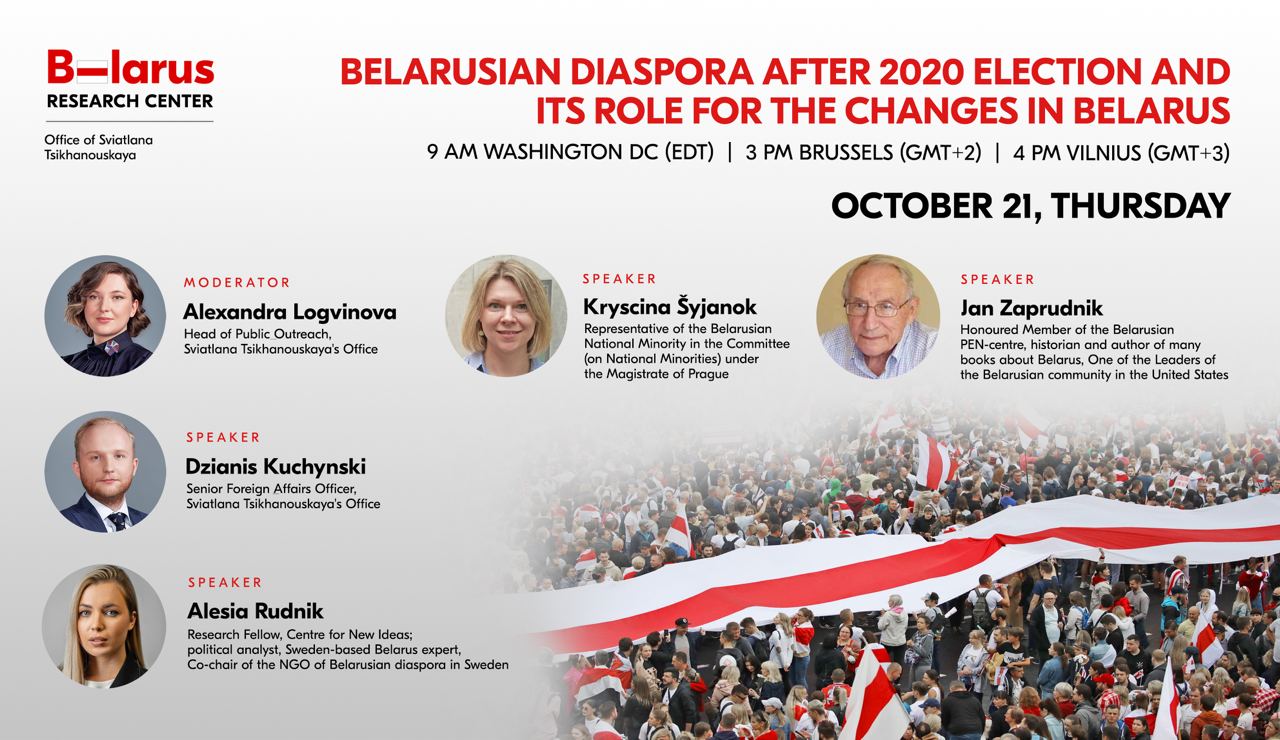The Research Center of Sviatlana Tsikhanouskaya's Office holds weekly online discussions with international and Belarusian experts on Belarus’ pressing matters. On October 21, 2021, we discussed the topic “Belarusian diaspora after the 2020 election and its role for the changes in Belarus”.
Dzianis Kuchynski, Senior Foreign Affairs Officer at the Office of Sviatlana Tsikhanouskaya, Kryscina Šyjanok, Representative of the Belarusian National Minority in the Committee (on National Minorities) under the Magistrate of Prague, Ekaterina Ziuziuk, Press secretary of the Belarusian Community in Italy Supolka, Alesia Rudnik, Research fellow at the Center for New Ideas and co-chair of the NGO of Belarusian diaspora in Sweden spoke about how the 2020 presidential election in Belarus and mass peaceful protests in the country affected the Belarusians abroad. The experts also discussed challenges that the diaspora faces and addressed the issue of coordination inside the diaspora and with the democratic forces. Alexandra Logvinova, Head of Public Outreach at OST, moderated the discussion.
The 2020 election in Belarus has caused an unprecedented wave of protest activity and political engagement of Belarusians. This trend affected not only those who live in the country but also Belarusians abroad, the diaspora. The latter became actively involved in the events taking place in the country; they were increasingly establishing relations with each other and those in Belarus. New projects and initiatives emerged in addition to the diaspora organizations which existed earlier. Protest actions, support of political prisoners and their families, assistance to those who had to leave Belarus because of the repressions, advocacy and promotion of the Belarusian agenda, and economic pressure are just some of the directions the Belarusian diaspora is engaged in today. Though, with more opportunities and human resources came the need to coordinate efforts and dovetail different approaches. In addition, Belarusian organizations abroad also face certain problems and challenges that need to be addressed.
The experts came to the following conclusions:
- The 2020 events in Belarus gave impetus to the formation of solid diaspora initiatives. The diaspora activities were adapting to the demands of the Belarusian society depending on the phase of the protest and political crisis:
1. The first phase was before and during the election: it was about encouraging and supporting Belarusians inside Belarus to claim changes, implementing exit polls in different countries, and communicating to the politicians abroad.
2. The second phase was just after the election: it was mainly about helping people who suffered during the protests and communicating to the politicians in different countries that Sviatlana Tsikhanouskaya is the president-elect and a legitimate leader of Belarus.
3. The next phase was about helping Belarusians with their resistance, including financial assistance, and informing the local government, media, and public about what was going on in Belarus.
- All in all, 2020 was an important year for the Belarusian diaspora. In order to produce an effective response to the political crisis in Belarus, the diaspora had to accept the fact of its diversity. Belarusian diaspora learned how to cooperate on specific activities, projects while having different political preferences and ideas.
- Today, the diaspora works in 2 main dimensions: media/advocacy and economic pressure. Cooperation with journalists and local governments is built mainly on personal contacts. Over the past year, diaspora activists have established networks of journalists, officials, etc. Examples of successful initiatives from the diaspora include enhanced media coverage, special projects dedicated to Belarus, and suspension of cooperation with Belarusian state enterprises by European companies.
- The diaspora stays in touch with the people in Belarus and supports them (including financial support). Besides, it helps with the official visits of Sviatlana Tsikhanouskaya to supporting countries, both before and afterward.
- Despite the overall politicization of the Belarusian diaspora, some of those initiatives that worked on cultural, educational, and other non-political issues, still prefer to abstain from politics. On the other hand, new initiatives emerged on the wave of 2020 and endeavor to expand. Proper communication is needed to prevent tensions between these factions.
- Belarusian diaspora initiatives develop voluntarily; they are a volunteer activity for most diaspora members. Lack of time and financial resources, as well as negative developments in Belarus, lead to both physical and emotional disinvolvement of the part of the people. It is advisable to conduct more offline meetings inside the diaspora in various countries and with the democratic forces – Office of Sviatlana Tsikhanouskaya in particular.
- Physical safety has become a concern for diaspora activists. The closer to Belarus the country is, the less secure members of the diaspora feel. But also, the affiliation with political leaders plays a role: the more important affiliation is, the less is the feeling of safety.
- While providing assistance to the Belarusian diaspora, it is essential to consider its’ multi-faceted structure in different countries. Assistance may include funding and providing facilities, offices, meeting points for the diaspora, etc.
- Diaspora’s activities need more coordination which might be provided via umbrella organizations that would coordinate efforts and allocate resources between the Belarusian diaspora initiatives. At least one such organization, the World Association of Belarusians Baćkaŭščyna, already exists. However, its cooperation with new diaspora’s initiatives has a limited character, and other initiatives and organizations might be created.
- The Office of Sviatlana Tsikhanouskaya could provide certain guidelines for the diasporas in their political activities, though it is necessary to preserve a balance between coordination and autonomy of the Belarusian organizations and initiatives abroad.
For questions about the discussion, contact researchcenter@tsikhanouskaya.org
For the OST position on relations with the diaspora, contact Alexandra Logvinova, head of Public Outreach at OST alexandra@tsikhanouskaya.org and Dzianis Kuchynski, Senior Foreign Affairs Officer at the Office of Sviatlana Tsikhanouskaya dzianis@tsikhanouskaya.org








